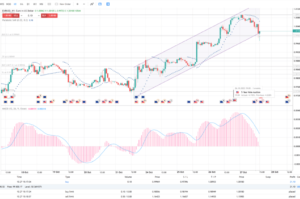
Big data and AI are remarkable technologies transforming the face of industries, setting a new benchmark in efficiency, accuracy, and productivity. However, like all technologies, they also come with their own set of challenges and risks.
One such critical area pertains to Intellectual Property (IP) laws. Given the massive amount of data processed and the autonomous decision-making capabilities of AI, it isn’t surprising that IP laws are getting increasingly involved.
This guide paints a comprehensive picture of the imminent collision course between these innovative technologies and existing IP laws and can help you gain illuminating insights into how they interact, potential conflicts, and the implications for your business.
An Overview of Big Data and Artificial Intelligence
Big data refers to an immense volume of structured and unstructured data, revolutionizing industries with its power to provide actionable insights. A prime example is the healthcare sector, where big data aids in predictive analytics for disease trends and personalized medicine.
Artificial Intelligence (AI), on the other hand, is a technology that simulates human intelligence in machines. It is practically ubiquitous in its application, with recent innovations such as OpenAI’s ChatGPT and Google’s Bard making significant strides.
Big data intertwines with AI tools to process and analyze big data, paving the way for more informed decision-making.
How IP Laws Apply to Big Data
When it comes to Big Data, you might initially perceive minimal interference with Intellectual Property (IP) laws. After all, data in its raw form is merely a massive collection of unprocessed information.
It’s the analytical processes involving specific hardware or software where IP laws come into play. By virtue of their unique designs and functionalities, they could potentially infringe on existing patents or copyrights or possess rights that need protection.
Once the data is analyzed, valuable deductions emerge, leading to the development of novel products and solutions. These innovations, born out of distilled data, can, in turn, become subjects of IP laws such as patent laws, thereby intertwining Big Data and IP Laws.
How IP Laws Apply to AI
In the realm of AI, Intellectual Property (IP) laws take a multifaceted role. For starters, AI tools, in essence, don’t create content on their own. They rely heavily on human content for learning and generating new content. This dependency leads to a problem – the risk of plagiarism when an AI tool replicates copyrighted work.
Finally, an intriguing question emerges concerning IP rights for content produced by AI. While most AI tools may not claim ownership of these rights, the future could paint a different picture as laws adapt to evolving technology.
The Legal Consequences of Using Big Data and Artificial Intelligence
Understanding the legal consequences of IP infringement is crucial for those utilizing Big Data and AI. Lawsuits can be daunting, potentially leading to significant financial ramifications and damage to reputation. Companies like Uber and Waymo have been embroiled in high-profile legal battles over alleged IP infringement related to their AI technologies, highlighting the seriousness of such issues.
To protect yourself from these IP lawsuits, enlisting a legal professional’s services is important. A firm such as Heer Law, with its expertise in IP law, would be an excellent resource to help navigate this complex landscape.
Remember, IP infringement isn’t just about staying on the right side of the law; it’s about ethical business practices and respect for innovation. By understanding the IP laws affecting Big Data and AI, you can ensure harmony between technological progress and legal compliance.
Final Thoughts
Navigating the intersection of Big Data, AI, and IP laws is complex but crucial for ethical and legal compliance. As technology advances, so must our understanding of related laws.
Enlisting expertise and investing in knowledge will ensure your business practices balance, innovation, and respect for IP rights.
- SEO Powered Content & PR Distribution. Get Amplified Today.
- PlatoData.Network Vertical Generative Ai. Empower Yourself. Access Here.
- PlatoAiStream. Web3 Intelligence. Knowledge Amplified. Access Here.
- PlatoESG. Carbon, CleanTech, Energy, Environment, Solar, Waste Management. Access Here.
- PlatoHealth. Biotech and Clinical Trials Intelligence. Access Here.
- Source: https://www.smartdatacollective.com/big-data-ai-in-collision-course-with-ip-laws-a-complete-guide/
- :is
- :not
- :where
- a
- About
- accuracy
- adapt
- advances
- affecting
- After
- AI
- aids
- All
- alleged
- also
- amount
- an
- Analytical
- analytics
- analyze
- analyzed
- and
- Application
- Apply
- ARE
- AREA
- artificial
- AS
- autonomous
- Balance
- battles
- BE
- become
- been
- Benchmark
- between
- Big
- Big Data
- born
- business
- business practices
- but
- by
- CAN
- capabilities
- challenges
- ChatGPT
- claim
- collection
- collision
- come
- comes
- Companies
- complete
- complex
- compliance
- comprehensive
- concerning
- conflicts
- Consequences
- content
- Copyrights
- could
- course
- create
- critical
- crucial
- damage
- data
- Decision Making
- Dependency
- designs
- Development
- different
- Disease
- Dont
- efficiency
- emerge
- emerges
- ensure
- essence
- Ether (ETH)
- ethical
- Ethical Business
- evolving
- example
- excellent
- existing
- expertise
- external
- Face
- financial
- Firm
- fluid
- For
- form
- from
- functionalities
- future
- Gain
- getting
- given
- Google’s
- guide
- hand
- Hardware
- Harmony
- Have
- healthcare
- healthcare sector
- heavily
- help
- high-profile
- highlighting
- How
- However
- HTTPS
- human
- human intelligence
- illuminating
- immense
- implications
- important
- in
- increasingly
- industries
- information
- informed
- infringement
- initially
- Innovation
- innovations
- innovative
- innovative technologies
- insights
- intellectual
- intellectual property
- Intelligence
- interact
- interference
- internal
- intersection
- into
- intriguing
- investing
- involved
- involving
- IP
- issues
- IT
- ITS
- jpg
- just
- knowledge
- landscape
- Law
- Laws
- Lawsuits
- leading
- Leads
- learning
- Legal
- like
- Machines
- Making
- massive
- May..
- medicine
- merely
- might
- minimal
- more
- most
- multifaceted
- must
- Navigate
- Need
- New
- novel
- of
- on
- or
- Other
- our
- out
- over
- overview
- own
- ownership
- paint
- patent
- Patents
- Paving
- Personalized
- picture
- plato
- Plato Data Intelligence
- PlatoData
- Play
- possess
- potential
- potentially
- power
- practically
- practices
- predictive
- Predictive Analytics
- Prime
- Problem
- process
- processed
- processes
- Produced
- productivity
- Progress
- property
- protect
- protection
- provide
- question
- ramifications
- Raw
- realm
- recent
- refers
- related
- rely
- remarkable
- replicates
- reputation
- resource
- respect
- Revolutionizing
- right
- rights
- Risk
- risks
- Role
- sector
- Services
- set
- setting
- side
- significant
- So
- Software
- specific
- starters
- staying
- strides
- structured
- such
- surprising
- Take
- technological
- Technologies
- Technology
- that
- The
- The Future
- the Law
- their
- thereby
- These
- they
- this
- those
- to
- tool
- tools
- transforming
- Trends
- TURN
- Uber
- ubiquitous
- understanding
- unique
- using
- Utilizing
- Valuable
- volume
- Way..
- waymo
- when
- while
- will
- with
- Work
- would
- you
- Your
- yourself
- zephyrnet









